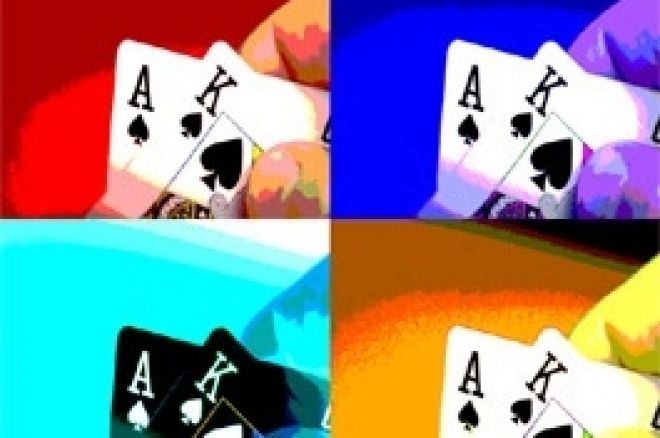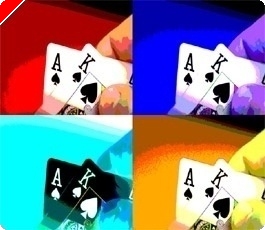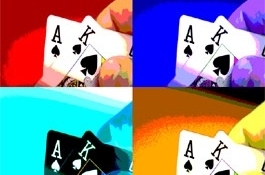Poker & Pop Culture: 'Star Trek: The Next Generation'

Sitting atop the box office charts this week is the latest entry into the Star Trek franchise, a new feature film that stands as a prequel to the original 1966-1969 television series. The new film is the eleventh one, building further on the complicated storyline presented in multiple television series over the last four-plus decades.
While references to poker turn up here and there amid the franchise��s many incarnations, it was the second major television series, Star Trek: The Next Generation (1987-1994), that saw poker become an especially meaningful part of the show. ST:TNG featured a new crew aboard a new Enterprise, boldly going on new adventures in the 24th century. Punctuating the new crew��s adventures was the senior staff��s weekly poker game, which over the course of TNG��s run provided a kind of motif upon which various character traits and thematic messages were frequently sounded.
The link between poker and ST:TNG would be furthered when one cast member, Wil Wheaton (who played Wesley Crusher), would subsequently become a formidable poker player in his own right, and for a time was a member of Team PokerStars.
Here are ten episodes from TNG in which poker was featured:
The Measure of a Man
Poker is introduced on an early episode of the series, one titled ��The Measure of a Man�� that appeared during the second season. The episode focuses on the character of Data (played by Brent Spiner), the so-called ��sentient�� android who serves as the Enterprise��s second officer. The question at issue in ��Measure of a Man�� is whether or not Data, on some level a ��machine,�� is nevertheless to be regarded as human. As a way of introducing the theme, the episode cleverly opens up on a poker game involving Data and some other officers.
��There��s more to this than just the cards, Data.�� So responds Lt. Geordi La Forge (Levar Burton) to Data��s pregame pronouncement that poker is ��exceedingly simple.�� The game is five-card stud, and soon Data finds himself involved in a hand with Commander William Riker (Jonathan Frakes). Data, having made three queens, fires a bet on the end, only to be raised by Riker who is showing 10?J?5?4?. Data folds, then Riker turns over his hole card �� the 2?.
��You have nothing!�� says Data. ��It makes very little sense to bet when you cannot win!�� The android is incredulous.
��But I did win,�� explains Riker. ��I was betting that you wouldn��t call.��
The main plot of the episode is then introduced. A visiting Commander named Bruce Maddox, a cyberneticist, wishes to disassemble Data in order to explore the possibility of building more androids like him. When it is determined that the procedure may in fact destroy Data, objections are raised. At one point, Data tries to explain to Maddox that even if he can physically download all of Data��s data in order to analyze it, he still won��t be able to capture the ��essence�� of who Data is.
��Take games of chance,�� says Data, still trying to explain. ��I had read and absorbed every treatise and textbook on the subject and found myself well-prepared for the experience [of playing poker]. Yet when I finally played poker, I discovered the reality bore little resemblance to the rules.�� Riker��s bluff has taught Data something about the difference between theory and practice, a difference which Data is convinced Maddox fails to appreciate.
Data decides to resign his post rather than be subject to the procedure. However, Maddox explains that since Data is not human, but rather ��property,�� he hasn��t the right to resign. A hearing is held to determine whether or not Data is in fact human or a machine, and ultimately Capt. Jean-Luc Picard (Patrick Stewart) is able to establish enough doubt regarding Data to encourage a favorable ruling and Maddox to withdraw his order.
The Price
Riker��s poker-playing prowess is evoked again in an episode from the third season titled ��The Price.�� In that one, Riker finds himself representing the Federation in negotiations with others for the proprietorship of a stable wormhole, a kind of passageway that would provide a valuable short cut across space.
In a private discussion, Riker reveals that in his opinion, the most worrisome foe in the negotiations is Devinoni Ral, representing the Chrysalians. ��You must play poker, Commander,�� a colleague responds.
��Commander Riker conducts master classes in poker,�� explains Picard.
Interestingly, it is later revealed in the episode that Ral is part ��betazoid,�� meaning he has ��empathic powers�� to sense others�� emotions. Another character, Counselor Deanna Troi (Marina Sirtis), is prominently featured in this episode; she, too, is part ��betazoid�� and so also has empathic powers. The implication here is that Riker��s poker skills helped him peg Ral as an especially suave negotiator.
Ethics
By the fifth season of TNG, poker began appearing more and more frequently on the series. A fifth season episode titled ��Ethics�� opens with Klingon Lt. Commander Worf (Michael Dorn) and La Forge discussing a recently completed poker game, in particular a hand in which Counselor Troi had successfully bluffed Worf out of a pot. Whereas Worf wasn��t sure he had been bluffed, La Forge is able to confirm he was thanks to the fact that with his VISOR (a Visual Instrument and Sensory Organ Replacement) he could see through the backs of the cards. La Forge insists, however, that he doesn��t take advantage of his visual edge during their games.
Makes one wonder, a little, how fair it would be to play poker against such an opponent! Not to mention against another (Troi) with ��empathic powers.��
The Outcast
In ��The Outcast�� (another episode from the fifth season), the crew encounter an androgynous species called the J��naii. The J��naii once did exist as male and female, though have evolved into a species that no longer recognizes the distinction, viewing the idea of gender difference as ��primitive�� and any sort of expression of such difference �� especially sexual activity �� as a perversion. Problems then arise when one of the J��naii and Riker commence a relationship.
Midway through the episode, Data, Worf, Troi, and Chief Medical Officer Dr. Beverly Crusher (Gates McFadden) play some poker. Again, they appear to playing dealer��s choice, and Troi announces the game she is about to deal is called ��Federation Day.�� When asked to explain, she says that since the Federation was founded in 2161, deuces, sixes, and aces are all wild.
��That is a woman��s game,�� says Worf. ��All of those wild cards �� they support a weak hand. A man��s game has no wild cards.�� His comment leads Dr. Crusher to note how she had just been explaining to a J��naii �� mistakenly, it appears �� that such prejudices no longer existed in the 24th century. Thus does the poker game, though not part of the main storyline, serve to comment further on the episode��s interesting interrogation of traditional gender roles.
Cause and Effect
The poker game returns in another fifth season episode, ��Cause and Effect.�� In this one, the crew of the Enterprise is charting an unexplored part of the universe when they encounter a ��highly-localized distortion of the space-time continuum.�� As it happens, they become caught in a ��temporal causality loop�� that culminates each time with a collision with another ship, destroying both.
Each time through the loop, the crew becomes increasingly affected by feelings of d��j�� vu, and eventually these feelings help them determine that they are, in fact, caught in a time loop, stuck there indefinitely thanks to the crashing of the ship. One of the repeated scenes comes from the poker game, specifically a hand of five-card stud dealt by Data to Riker, Worf, and Crusher. The first time through, Crusher successfully calls Riker��s bluff after he misses his straight draw. However, the second time, Riker senses that Crusher will call his bluff, and so abandons the hand. By the third time, the players are calling out the cards before they are dealt, one of several clues leading them to figure out they are stuck in the time loop.
The crew decides to try to send a message to themselves, a warning of the impending disaster, as a means to try to escape the loop. They run through the same scenes once more, only this time the number three keeps appearing in unlikely ways, including in the card game, where everyone��s initial up cards are treys, then each player is improbably dealt trips on the next three streets. As it happens, these clues have been planted, including Data��s having stacked the deck. They reach the final chaotic moments before the crash once again, when alternate plans for averting disaster are again being proposed by crew members. Data recognizes Riker has three rank insignia on his uniform, goes with his plan, and the crew is able to avoid the crash and escape the time loop.
Time��s Arrow
Data��s successful tutelage in poker is later proven in ��Time��s Arrow,�� a two-part episode that closed the fifth season and opened season six. In that one, the Enterprise goes back to Earth in order to investigate evidence that aliens had been there during the late 19th century �� evidence that includes, oddly enough, Data��s severed head.
During the investigation, Data slips through a time portal and ends up alone in San Francisco in 1893. Stuck without money, he is able to start his progress back to the Enterprise and the 24th century in a poker game. Before he returns, however, Data interacts with another famous poker player, Samuel Clemens (Mark Twain).
The Quality of Life
The poker games continued through the sixth season, including in ��The Quality of Life,�� another episode that explored the question of the difference between human and machine. Again, the episode begins with the poker game, with Dr. Crusher announcing the game as seven-card stud with one-eyed jacks wild.
As the game proceeds, the players are discussing La Forge��s new beard, leading Crusher to say she has always been suspicious of men in beards. ��It��s as though they are trying to hide something,�� she says.
Riker and Worf quickly defend their decisions to grow beards, with Worf saying a beard is a ��symbol of courage�� and Riker a ��sign of strength�� �� comments Crusher immediately reads as slighting women, who cannot grow beards.
They decide to change the stakes of the game: if Crusher wins, the men will shave their beards; if she loses, she must dye her hair and become a brunette. They begin the hand, but the game gets interrupted, much to Crusher��s dismay, who apparently had a nice start to her stud hand.
Descent
One of the more memorable poker scenes from TNG comes at the beginning of the two-part episode ��Descent�� that closed the sixth season and opened season seven. In the scene, Data plays a poker game with Albert Einstein, Sir Isaac Newton, and Stephen Hawking (played by himself) on the holodeck �� a kind of virtual reality room in which individuals can interact with holographic simulations. The trio share some humorous banter until Newton gets impatient with Einstein, who is having trouble adding up what is needed to stay in the hand.
��What is the point of this ridiculous game?�� asks an exasperated Newton. Data explains: ��When I play poker with my shipmates, it often appears to be a useful forum for exploring the different facets of humanity. I was curious to see how three of history��s greatest minds would interact in this setting. So far it has proven quite... illuminating.�� Data��s tone suggests a certain sarcasm, as if the experiment has actually been less illuminating than he had hoped.
The group appears to be playing five-card draw, and when Hawking raises both Newton and Data out of a pot, Einstein responds confidently. ��The uncertainty principle will not help you now, Stephen,�� says Einstein. ��All the quantum fluctuations in the universe will not change the cards in your hand. You are bluffing, I call.�� At which point Hawking shows his quad sevens.
Lower Decks
In another episode from the sixth season, ��Lower Decks,�� we learn that not only does the senior staff play poker, but so do the junior officers. In this episode, the junior officers are being evaluated for promotions. They gather for their game at the same time the senior staff is playing theirs, and cross-cutting between the games shows that each group is sharing speculations about members of the other. The cross-cutting between the games also highlights parallels between Riker and a junior officer named Lavelle. Both make big bets at the end, and in both cases their opponents suspect them of bluffing and are called. Riker, it turns out, was not bluffing, while Lavelle was.
All Good Things...
As if to confirm the significance of poker on TNG, the final episode of the series �� titled ��All Good Things...�� �� concludes with one last poker game. In this two-parter, Capt. Picard suffers through a neurological difficulty called Irumodic syndrome, causing him to move wildly back and forth through time. After much drama and strife, it is discovered near the end of the episode that the entire ordeal has been caused by the recurring character named ��Q�� (played by John de Lancie) as a kind of test of Picard.
In the closing minutes of the episode, the senior staff is shown gathering around the poker table one last time. Riker is once more dominating the game. ��Four hands in a row, how does he do it?�� asks Worf (who never seems to win).
��I cheat,�� says Riker. Data looks up in alarm. ��Only kidding,�� Riker explains.
Picard then arrives and surprises the crew by asking if he might join the game. They offer him a chair and invite him to deal. As he shuffles the cards, he stops and gazes around the table. ��I should have done this a long time ago,�� says Picard.
��You were always welcome,�� says Counselor Troi.
It��s a genuinely moving moment, coming after an episode in which Picard��s sense of self has been challenged considerably. Much as the poker game functioned in earlier episodes to help clarify certain ideas about what constitutes life and humanity, gender roles, relationships, and other matters, here the game is clearly connected to the idea of friendship, helping to confirm a final message of the episode and of the series.
��Five-card stud, nothing wild,�� says Picard, announcing the game. ��And the sky��s the limit.��








